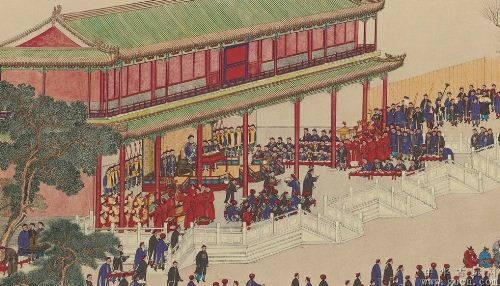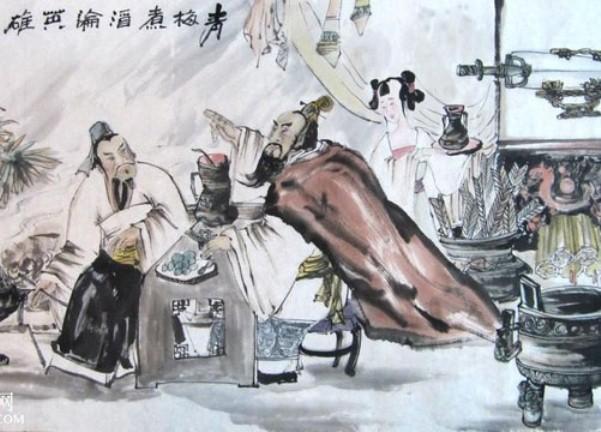China is one of the largest countries in Asia, and it has a long and rich history that has greatly influenced its neighboring countries, including Vietnam. Did you know that four of the most powerful banquets in China’s history could broaden your perspective just by understanding a fraction of them?
1. The Hundred Feasts Banquet
According to folklore, Duke Huan of Qi once hosted a banquet for his high-ranking officials. During this feast, Bao Shuya had a live, tied-up ox brought before them. He led the ox to Ning Xi and threw the rope to Pan Geng, asking them solemnly:
“Ning Xi, do you remember when we were so poor that we barely had enough to eat and had to sleep outside the city gates, cutting grass and herding cattle to survive?”
“Pan Geng, do you recall when you fled to Lu, only to be imprisoned and awaiting execution?”
“And what of our princess, who was exiled in Ju, living in constant fear like a fattened ox awaiting slaughter?”

The Hundred Feasts Banquet
These questions shamed Duke Huan, leading him to cancel the feast and discuss state affairs with his officials. That very night, with their help, he devised the strategy of “honoring the king while yielding the land,” eventually rising to become the Spring and Autumn Period’s hegemon.
Lesson: Those who fail to plan ahead will inevitably face impending disaster. In life, we must maintain a vigilant mind and create enough pressure to unleash our full potential. Push yourself to prepare for danger during peaceful times, and you will be able to calmly face any storm that comes your way.
2. The Exquisite Banquet
In 606 BC, King Zhuang of Chu defeated Lu Xun and celebrated his victory with a banquet. During the festivities, his concubine, Lady Xu, sang and danced to commemorate the triumph. However, a drunken guest took advantage of a brief blackout and harassed her. In her panic, she managed to grab the red tassel from his hat and later asked the king to light the lamps to identify the offender, but he intervened on behalf of his subordinate.
Later, when the king faced danger, this same general came to his rescue and consistently contributed to the state of Chu’s military successes.
Lesson: Everyone makes mistakes, and forgiveness can often win people’s favor more effectively than blame and condemnation.
3. The Feast of Hong Men
In 207 BC, Liu Bang led an attack on Xianyang, arousing suspicions of his ambition to become king. Xiang Yu, leading an army of 400,000 soldiers from over a dozen vassal states, marched into Guanzhong and held a banquet at Hong Men, intending to interrogate Liu Bang.
On the day of the banquet, Liu Bang brought only a few confidants and humbly stated:
“Upon entering Guanzhong, I dared not take anything for myself. I registered the officials and sealed the warehouses, awaiting your arrival. I have been eagerly anticipating you, so how could I dare to rebel?”
Liu Bang’s sincerity made Xiang Yu believe that he was testing his generosity, and his anger dissipated. Throughout the banquet, Liu Bang consistently followed a principle: whenever there was an issue, he would kneel and apologize, feigning humility. As a result, Xiang Yu let his guard down completely and even bestowed upon him the title of “King of Han.”
Lesson: A true gentleman who wishes to accomplish great things must know how to “endure.” Many fail because they cannot look beyond immediate gains.
4. The Qingmei Wine Tasting Banquet

The Qingmei Wine Tasting Banquet
In 196 AD, Liu Bei was appointed as the Imperial Uncle by Emperor Xian of the Han dynasty to curb Cao Cao’s power. Naturally, this aroused Cao Cao’s suspicion, so he invited Liu Bei to a banquet at his mansion, intending to test him.
Upon learning of this, Liu Bei smeared dirt from the vegetable garden on his face and pretended to be relaxed. During the banquet, Cao Cao repeatedly tried to gauge Liu Bei’s ambitions. Despite his awareness of Cao Cao’s intentions, Liu Bei deliberately acted clumsy and spoke off-topic. As a result, Cao Cao let down his guard, allowing Liu Bei the opportunity to escape with his troops.
Lesson: Whether something turns out to be a blessing or a curse depends entirely on the individual. Sometimes, clumsiness can be a form of wisdom that helps one avoid misfortune.
1. ‘The Feast of Hong Gate’ – a lesson in loyalty and the dangers of ambition.
2. ‘The Feast of Penglai Mountain’ – showcasing the power of nature and a warning against excess.
3. ‘The Feast of Peaches’ – a celebration of life, femininity, and a reminder of the importance of harmony.
4. ‘The Mid-Autumn Festival’ – symbolizing unity, rebellion, and the power of the human spirit.





































